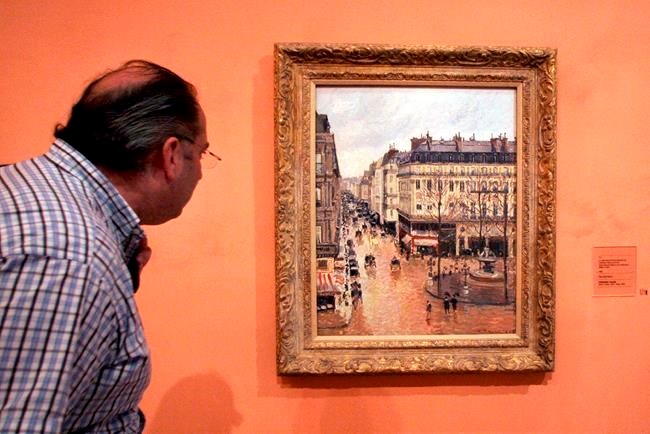LOS ANGELES — A U.S. appeals court has ruled that a Camille Pissarro painting a Jewish woman traded to the Nazis to escape the Holocaust in 1939 may remain the property of a Spanish museum that acquired it more than a half-century later.
The unanimous ruling issued Monday by a three-judge panel of the 9th U.S. Circuit Court of Appeals is the latest — but possibly not the last — in a case that has wound through the courts of Spain and the United States for 20 years.
At stake is "La Rue St. Honoré, effet de Soleil, Après-Midi, 1898,” an oil-on-canvas work of a rain-swept Paris street that Pissarro painted as he gazed at the scene from his hotel window. Its value has been estimated at $30 million.
Lilly Cassirer’s father-in-law bought it directly from Pissarro’s art dealer and left it to her and her husband when he died. In 1939, she traded it to the Nazis in exchange for exit visas for herself, her husband and her grandson, who eventually settled in the U.S. Her great-grandson, David Cassirer of San Diego, has continued the litigation since his father's death.
Neither Cassirer's heirs nor Spain's Thyssen-Bornemisza Museum dispute the painting's early history.
What's at issue all these years later is whether Baron Hans Heinrich Thyssen-Bornemisza made any serious effort to determine the painting was looted art when he acquired it from a New York gallery owner for $275,000 in 1976.
Also whether Spanish curators did their due diligence in tracing its provenance when a Spanish
Lilly Cassirer’s heirs say she spent years trying to recover the painting before concluding it was lost and accepting $13,000 in reparations from the German government in 1958.
It wasn’t until 1999 that her grandson, Claude, who had vividly recalled seeing it hanging in the family's German home, discovered it in the Madrid museum. After Spain refused to hand it over, he sued.
Attorney Thaddeus Stauber, who has represented the museum since the case reached U.S. courts in 2005, hailed Monday's decision, noting that the painting was sold and resold to numerous legitimate and prominent collectors over the years before the baron obtained it, with none discovering it had been seized by the Nazis.
He said there also appeared to be no effort by Thyssen-Bornemisza or any other collector to hide it from the public.
“We've been transparent from the start of this case, and we're very pleased that there's been a trial now and it brings it to a conclusion, we trust," he said Tuesday.
He did say the Cassirer family may appeal to the full 9th Circuit or even the U.S. Supreme Court.
The family did not respond to a request for comment Tuesday, but the president of the Holocaust Survivors Foundation USA denounced the decision.
“The Nazis murdered more than 6 million Jews, including 1.5 million children under the age of 12, and including 105 members of my family,” David Schaecter said. “How on God’s Earth can Spain fight so hard to deny a Jewish family its precious legacy that was looted by the Nazis? And how on God’s Earth can an American court ignore the unprecedented trauma of the Holocaust and reward Spain for its greed?"
Both U.S. District Judge John Walter, in a 2019 ruling, and the appeals court in Tuesday's, criticized the baron and the Spanish foundation for not doing more to discover whether the painting was looted art. But both courts concluded there was no proof either deliberately hid that it was.
Both courts also criticized Spain for not living up to what the courts called “moral commitments” to return Nazi-looted art.
"It is perhaps unfortunate that a country and a government can preen as moralistic in its declarations, yet not be bound by those declarations. But that is the state of the law," the appeals court said in its ruling.
John Rogers, The Associated Press




